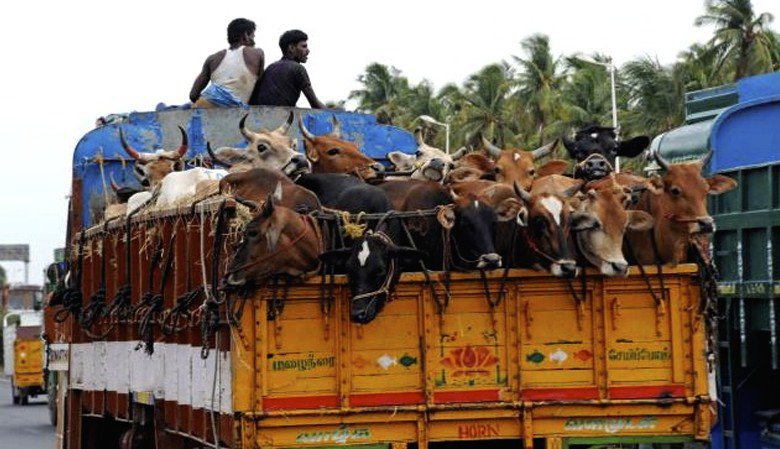Significance of CVs in the livestock industry

The livestock industry is vital for agriculture and is significant in providing millions of people’s food, income, and livelihoods worldwide. Commercial vehicles are instrumental in supporting and advancing various aspects of the livestock industry. Let’s understand their significance and explore their multifaceted impact, which can be divided into several key areas.
Commercial Vehicles Providing Betterment to Livestock Industry
Commercial vehicles are the foundation of the livestock industry, supporting its working, effectiveness, and supportability. These vehicles are vital in associating country and metropolitan regions, supporting jobs, and working with the global exchange of livestock industry. Moreover, Tata Intra is one of its USPs and offers sustainable livestock businesses in India. Let’s have a look at the major applications of commercial vehicles in the livestock industry.
Livestock Transportation:
Livestock transportation is a basic part of the Livestock industry. Commercial vehicles, like trucks and trailers, are fundamental for moving animals from homesteads to business sectors, handling plants, and slaughterhouses. These vehicles guarantee the security and prosperity of the creatures while travelling. Proper ventilation, temperature control, and space are pivotal variables that commercial vehicles maintain the well-being and nature of livestock.
Supply Chain Efficiency:
The livestock network depends on the opportune and proficient development of creatures, feed, and different assets. Commercial vehicles are the foundation of this production network, guaranteeing that livestock farms get fundamental information sources. Moreover, it includes feed, antibodies, and meds while working with animal transportation to different destinations. However, Ashok Leyland Boss is one of its USps and efficiently caters to all these applications. The efficiency of these supply chains impacts the overall productivity and profitability of the livestock industry.
Livestock Markets:
Livestock markets are central to the livestock industry, serving as hubs for buying and selling animals. Commercial vehicles are instrumental in bringing animals to these markets, connecting buyers and sellers from different regions. Livestock traders and farmers depend on these vehicles to transport animals to auctions and marketplaces, contributing to the industry’s dynamism.
Livestock Health and Welfare:
Commercial vehicles play a vital part in maintaining the well-being and government assistance of livestock. The transportation cycle should be painstakingly figured out how to decrease pressure and guarantee the prosperity of the creatures. Present-day commercial vehicles consolidate shock-retaining flooring, environment control, and secure parts to limit pressure and wounds during travel. Legitimate dealing with and transportation are crucial for guaranteeing the nature of meat and dairy items obtained from livestock
Disease Control:
Livestock diseases can have devastating consequences for both animal health and the economy. Commercial vehicles are essential in implementing disease control measures. They enable the isolation and transportation of sick animals to quarantine facilities, reducing disease risk. Additionally, strict biosecurity protocols are often followed during livestock transportation to minimise disease transmission.
Dairy Industry
The dairy business depends on business vehicles to move milk from homesteads to handling plants. Dairy farms, frequently arranged in provincial regions, need solid transportation. Moreover, it guarantees that crude milk arrives at handling offices expeditiously and cleanly. Commercial milk tankers are utilising cooling and storage facilities to maintain milk quality during transit.
Poultry Industry:
Commercial vehicles are crucial for transporting broiler chickens, layers, and other poultry products in the poultry industry. Poultry farms produce large volumes of meat and eggs, which must be transported to processing plants and distribution centres. Specialised vehicles designed for poultry transportation provide the necessary conditions to ensure the welfare and quality of the birds.
Meat Processing and Distribution:
Commercial vehicles transport meat products from processing plants to distribution centres and retail outlets. These vehicles ensure that fresh and frozen meat products reach consumers safely and on time. Temperature-controlled trucks and refrigerated containers are commonly used to maintain the quality and safety of meat during transit.
International Trade:
Livestock and livestock products are traded globally, contributing to international food security and economic growth. Commercial vehicles are pivotal in facilitating the export and import of livestock and related products. They are responsible for the safe and compliant movement of animals and animal products across borders. Moreover, it adheres to international regulations and standards.
Livestock Farming Support
Commercial vehicles support livestock farmers by transporting feed, bedding, and equipment to farms. These vehicles ensure that farms can access the necessary resources to maintain animal health and productivity. They also enable the removal of waste and byproducts, contributing to farm hygiene and environmental sustainability.
Research and Development:
Commercial vehicles are instrumental in supporting research and development efforts within the livestock industry. These vehicles help transport animals to research facilities where studies on genetics, nutrition, disease control, and animal behaviour are conducted. The insights gained from such research contribute to improving livestock breeding and management practices.
Rural Livelihoods:
In many rural areas, commercial vehicles in the livestock industry provide essential livelihood opportunities. Transporting livestock, animal products, and feed can be a source of income for small-scale transport operators. This economic activity supports rural communities and contributes to their socio-economic development.
Regulatory Compliance:
Commercial vehicles involved in livestock transportation are subject to strict regulations to ensure the safety and welfare of animals. These regulations encompass vehicle design, animal handling procedures, and health and safety standards for drivers. Compliance with these regulations is crucial for the ethical and legal operation of the livestock transportation sector.
The Ending Thoughts:
As the global demand for livestock products continues to rise, the role of commercial vehicles in this industry remains indispensable. Moreover, food security and economic growth objectives are important for meeting them.
They are essential for transporting livestock, feed, and animal products, contributing to animal welfare, disease control, and quality livestock-derived products.
Stay tuned with us for more information.



